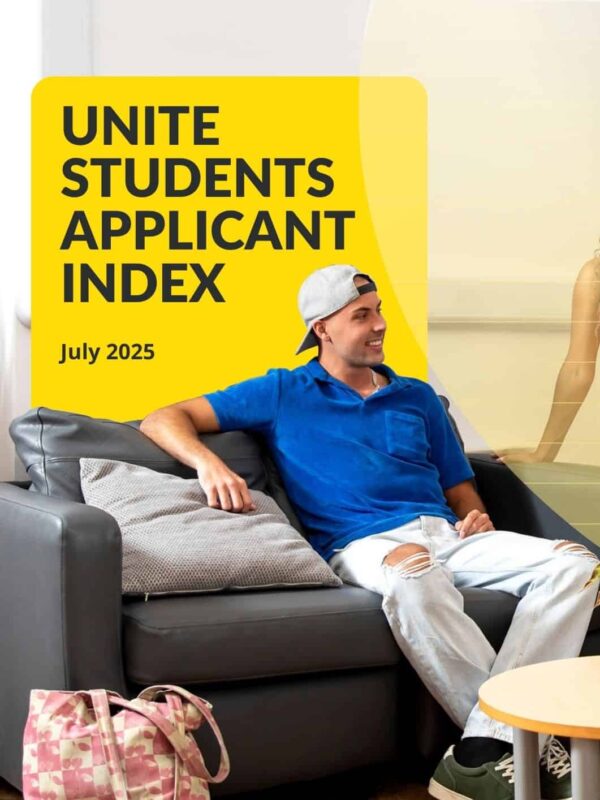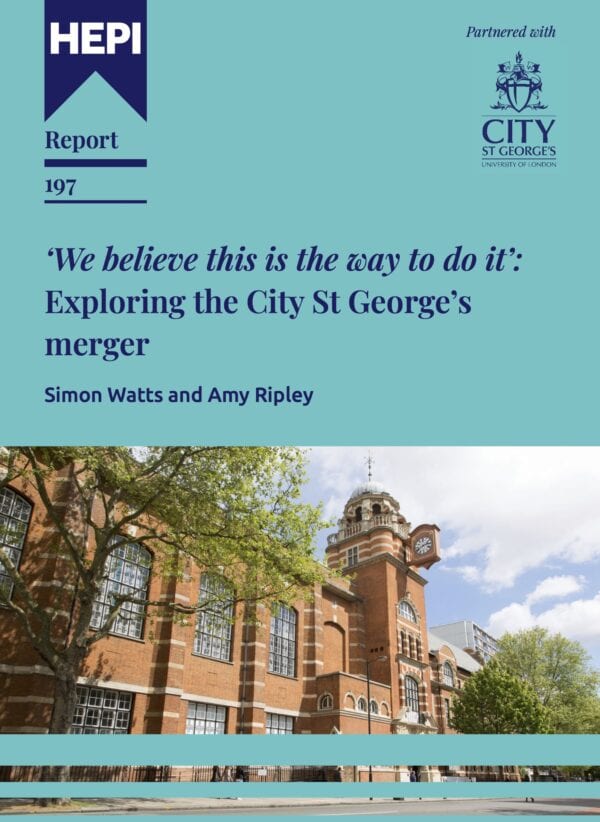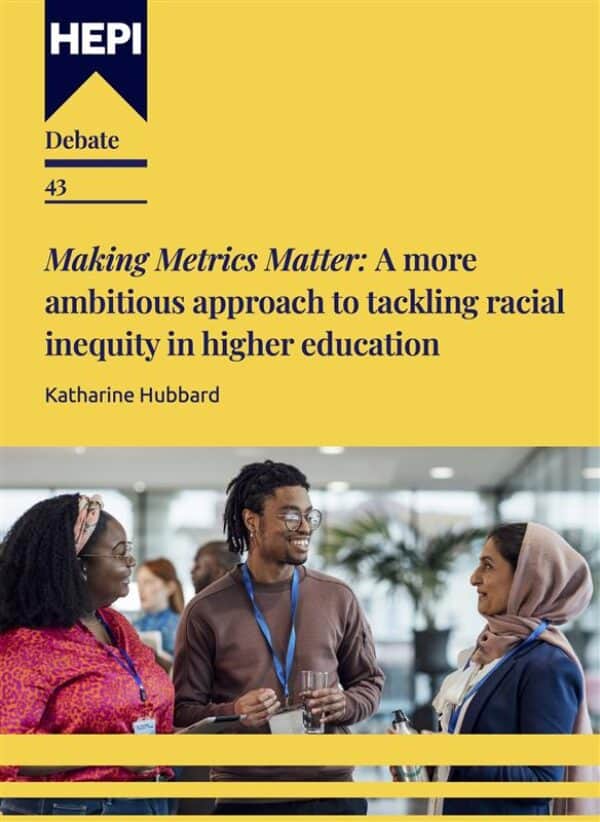Unite Students Applicant Index shows student wellbeing surpasses pre-pandemic levels for the first time
Today, Unite Students is launching the 2025 edition of its Applicant Index in partnership with HEPI.
- Wellbeing on the rise: University applicants’ wellbeing surpasses pre-pandemic levels for the first time when measured against key ONS metrics.
- Optimism comes with a caveat: International applicants feel happier, more satisfied, and that their life is more worthwhile than their peers in 2019, while UK applicants’ outlook has remained broadly flat in recent years.
- Improving picture on mental health: Mental health conditions remain stable, with the number of applicants experiencing anxiety falling over the last two years.
- Financial confidence on the up: Financial confidence has improved after a downturn in 2024 — 82% of international applicants are confident budgeting compared to 54% of UK applicants.
- Loneliness remains: One in four (24%) applicants feel lonely all or most of the time -although, this figure has fallen from 20% to 13% among international applicants in the last year.
- Stronger sense of belonging: Applicants are more confident they will feel welcome and like they belong than last year, according to a new report from Unite Students and Higher Education Policy Institute (HEPI).
Student wellbeing has surpassed pre-pandemic levels for the first time, according to a new report.
The Unite Students 2025 Applicant Index, conducted in partnership with Higher Education Policy Institute (HEPI), found that university applicants feel happier, more satisfied, and that their life is more worthwhile than their peers in 2019 (see Figure 13 below).
The recovery is being led largely by international students who have experienced the biggest improvement in wellbeing, while the outlook of their UK peers has remained largely flat in recent years.
The Index, now in its fourth year, is the only research to track applicants’ attitudes and experiences across a broad range of themes, including wellbeing, finance and mental health year-on-year.
Improving picture on mental health
The report shows that mental health conditions experienced by applicants over the last two years have remained stable and students experiencing anxiety has fallen from 38% to 35% during that time.
Nearly two thirds (62%) of international applicants report no mental health issues, compared to 38% of UK applicants. The latter are significantly more likely to have experienced anxiety (40% vs 23%), depression (24% vs 15%) and eating disorders (14% vs 7%), compared to their international counterparts.
Financial confidence on the up
After a downturn last year, overall financial wellbeing has returned to 2023 levels, driven by greater confidence in three areas: having enough money to cover costs, having family and friends to ask for help and being confident about budgeting.
More than four in five (82%) international applicants feel confident in their ability to budget, up from 70% last year — 54% of UK applicants feel the same way.
Loneliness remains
One in four (24%) of this year’s cohort admit to feeling lonely all or most of the time.
In the last year, rates of loneliness have widened between UK and international applicants. Fewer than one in seven (13%) international applicants say they feel lonely all or most of the time compared to 20% in 2024. However, this figure has remained largely flat among UK applicants — increasing marginally from 27% to 28% during the past 12 months.
Stronger sense of belonging
This year’s applicants are more confident they will feel welcome and a sense of belonging than those in 2024. Three-quarters (74%) expect they will feel like they belong at university, up from 68% last year, and those expecting to feel welcome have increased from 58% to 64%.
This sense of belonging is particularly high among international students (88%) compared to UK applicants (79%), with the former also more likely (89%) to want to be an active part of the student community than their domestic peers (66%).
Jenny Shaw, HE External Engagement Director at Unite Students, said:
“This year shows encouraging signs of recovery among higher education entrants, compared to last year’s cohort. Applicants have reported higher social and academic confidence, improved resilience and better financial wellbeing.
“However, the Index highlights a persistent gap between UK and international applicants, with the latter reporting greater confidence across almost all areas, particularly wellbeing. While this is not unexpected as international applicants are those with the confidence and resources to study overseas, it has implications for higher education support services, especially for HE providers who are recruiting a higher proportion of UK students this year.
“Creating an environment in which students can thrive and belong is vital. This year we’ve put further investment into our resident ambassadors, who work alongside our teams to create the community and sense of belonging this incoming cohort is craving. We also provide round-the-clock in-person support, and our residents have access to a 24/7 helpline and wellbeing app to help them to track their wellness, improve mental health and stay resilient.”
Nick Hillman OBE, Director of HEPI, said:
“The Unite Students’ Applicant Index is a vitally important survey because of what it reveals about the preparedness and expectations of those on their way to higher education. This year’s results show grounds for hope, as the pandemic recedes into the distance, after many years when the obstacles to learning were growing.
“It is nerve-racking to stand on the cusp of university life and these results will help universities and student accommodation providers prepare for the next generation of undergraduates. I praise Unite Students for amplifying applicants’ own voices so that they can be heard by those with influence and power.”
About Unite Students
Unite Students is the UK’s largest owner, manager, and developer of purpose-built student accommodation (PBSA).
With more than 150 properties in 23 leading university towns and cities, Unite Students is home to around 70,000 students, living predominantly in en-suite study bedrooms with rents covering bills, insurance, and 24-hour security.
Driven by a common purpose: to provide a ‘Home for Success’ to live, work and invest, Unite Students is committed to raising standards in the student accommodation sector with the support of over 60 university partners.
Founded in 1991 in Bristol, the Unite Group is an award-winning Real Estate Investment Trust (REIT), listed on the London Stock Exchange.
For more information, visit Unite Group’s corporate website www.unitegroup.com or the Unite Students’ site www.unitestudents.com.
About HEPI
HEPI was established in 2002 to influence the higher education debate with evidence. We are UK-wide, independent and non-partisan. We are funded by organisations and higher education institutions that wish to support vibrant policy discussions, as well as through our own events. HEPI is a company limited by guarantee and a registered charity.








Comments
Ana Salazar says:
These are very interesting results. Definetely an overall positive picture for international applicants. I wonder how these results can interact with those of the Russell Group Student’s Union report on international students, which paints a somewhat grimmer picture. Could this be a case of these students being better off from the start? Should we then see more positive results in future international student’s surveys? Or could the actual university experience negatively affect their wellbeing and sense of belonging, for example.
In any case these are key indicators to track if we want to understand student wellbeing overall.
Reply
Ros Lucas says:
Loneliness is an important well-being aspect – why not introduce the programme done in Holland, where students live-in and help older citizens in their homes for free, just buying in food and drink required…
Works well for all…
Reply
A.B says:
This is interesting considering that unite students have a 2.7 trust pilot rating , with students complaining about a bunch of things such as the accomodation itself and their mental health . Even though, the majority may be happy it is insensitive to post this. A PREGNANT WOMAN was abused, bullied and harassed in unite students in which they did nothing to protect her, and even experienced bullying and harassment from the staff. Protect women, do not book unite students
Reply
Add comment